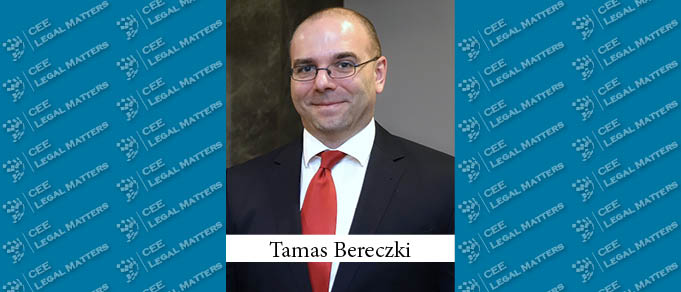An in-depth look at Tamas Bereczki of Provaris Varga & Partners covering his career path, education, and top projects as a lawyer as well as a few insights about him as a manager at work and as a person outside the office.
Career:
Provaris Varga & Partners, Partner / Attorney-at-Law, 2019 – Present
Baker McKenzie Budapest, Senior Associate / Attorney-at-Law, 2018 – 2019
Deloitte Hungary, Manager at the IT Risk Advisory Department, 2016 – 2018
Citi Bank Plc, mid-level IT Risk Analyst, 2015 – 2016
Erste Bank Hungary, Information Security Expert, 2011 – 2015
The Prosecution Service of Hungary, from Trainee to Clerk to Public Prosecutor, 2005 – 2011
Education:
International Association of Privacy Professionals [IAPP], Certified Information Privacy Professional / Europe [CIPP/E], 2018
ISACA, Certified Information Security Manager [CISM], 2016
ISACA, Certified in Risk and Information Systems Control [CRISC], 2015
Obuda University, John von Neumann Faculty of Informatics, Computer Science & Engineering BSc, 2011
Eotvos Lorand University, Faculty of Law, Degree in Law, 2005
Favorites:
Out of office activity: Spending time with my family, Working out, Playing computer games, Reading
Quote: “[…] and my father, standing by the door, asked him, how many times, my father, you read that [book]? for the third time; once because I wanted it; once because I understood it, and now, I am saying good bye to it, and he re-read all the books that were important to him […]” – Harmonia Caelestis by Peter Esterhazy
Favorite book: Foundation by Isaac Asimov
Movie: Ghost in the Shell (1995) directed by Mamoru Oshii
What would you say was the most challenging project you ever worked on and why?
Bereczki: I was involved in a CRM implementation project that was a pilot to an agile organizational transformation. My role in the project was to secure regulatory compliance and assist the project manager relative to quality assurance. Working within agile projects and securing regulatory compliance goals is challenging, as compliance requirements must be identified up-front and communicated in a prompt manner to allow programmers to design functions and architects to design systems accordingly, especially when the goal is to connect state-of-the-art IT services with a legacy core system. On top of that, we had to work with people from the client who didn’t want any change and therefore, the project had major obstacles as being the first agile project in the organization.
And what was your main takeaway from it?
Bereczki: My key takeaways were that upper management may set goals and approach on conducting work or operations, but people’s mindsets cannot be changed, and organizational learning is a very slow process. For me, this means that sometimes it is easier to change the setup around people, rather than their mindset, and actual change will come by being persistent not by pushing.
What is one thing clients likely don’t know about you?
Bereczki: I am an open book to them. All they need to do is to ask me. Jokes aside, I learn and use keyboard shortcuts in software I use for work to be more time-efficient.
Name one mentor who played a big role in your career and how they impacted you.
Bereczki: Lajos Antal, Cybersecurity Partner at Deloitte. He told me about the importance of the convergence of professionals with different backgrounds to effectively overarch my own shortcomings, how to recognize and analyze new trends and catalyze such trends in the local market. Some of his feedback, intentionally or not, taught me how to differentiate between what is important in my own professional life, in conducting business, and what is not important at all. Interactions with him taught me the importance of paying attention to details and meta-communications and of adjusting my business-related conduct accordingly.
Name one mentee you are particularly proud of.
Bereczki: Eszter Seres. She joined our firm with a very different professional background than what she’s doing right now. I think we share very similar professional values, which makes our interactions easier. Eszter has a similar drive to mine, and I believe I was able to help her in making certain life decisions. I think mentoring someone is not just about showing them how to climb the career ladder at a certain firm or company, or demonstrating the nitty-gritty of the importance of fancy PowerPoint presentations, but to help them overcome their current situation, either by revealing their further potential, being honest, or simply just widening their perspective by showing things (even things yet to explore) from certain points of view.
What is the one piece of advice you’d give yourself fresh out of law school?
Bereczki: I would rather give my younger self three pieces of advice as one may not achieve the intended outcome: (1) Be persistent in your goals and round in your ways; (2) Fail seven times, still get up for the eighth time; (3) Relax – all things will be sorted out in the end.
This Article was originally published in Issue 9.3 of the CEE Legal Matters Magazine. If you would like to receive a hard copy of the magazine, you can subscribe here.
